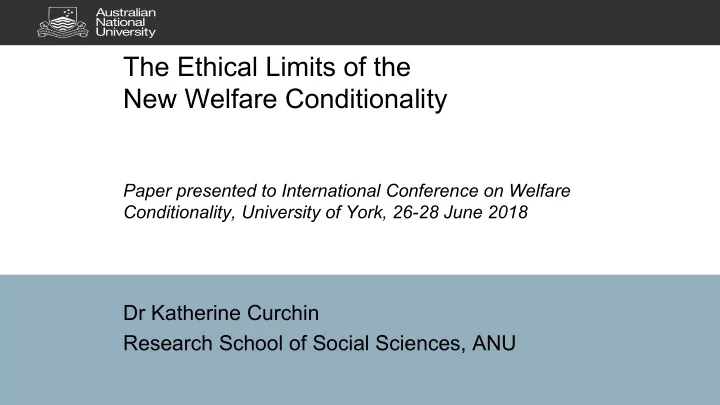

The Ethical Limits of the New Welfare Conditionality Paper presented to International Conference on Welfare Conditionality, University of York, 26-28 June 2018 Dr Katherine Curchin Research School of Social Sciences, ANU
Outline 1. The “New Conditionality” 2. Focus on ethics 3. No Jab, No Pay 4. Mutual Obligation 5. What’s wrong with incentives? 6. Conclusion 2
Outline 1. The “New Conditionality” 2. Focus on ethics 3. No Jab, No Pay 4. Mutual Obligation 5. What’s wrong with incentives? 6. Conclusion 3
Outline 1. The “New Conditionality” 2. Focus on ethics 3. No Jab, No Pay 4. Mutual Obligation 5. What’s wrong with incentives? 6. Conclusion 4
Outline 1. The “New Conditionality” 2. Focus on ethics 3. No Jab, No Pay 4. Mutual Obligation 5. What’s wrong with incentives? 6. Conclusion 5
6
Outline 1. The “New Conditionality” 2. Focus on ethics 3. No Jab, No Pay 4. Mutual Obligation 5. What’s wrong with incentives? 6. Conclusion 7
8
Outline 1. The “New Conditionality” 2. Focus on ethics 3. No Jab, No Pay 4. Mutual Obligation 5. What’s wrong with incentives? 6. Conclusion 9
My key argument Governing behaviour through incentives rather than reasons demonstrates a lack of respect for the autonomy of citizens. The new conditionality is inherently illiberal. 10
Incentives are problematic because: 1. They are insulting 2. They divert attention from persuasion 3. They can exert undue influence 11
12
Outline 1. The “New Conditionality” 2. Focus on ethics 3. No Jab, No Pay 4. Mutual Obligation 5. What’s wrong with incentives? 6. Conclusion 13
Key References Attwell, K., Leask, J., Meyer, S.B., Rokkas , P. & Ward, P. (2017). Vaccine rejecting parents’ engagement with expert systems that inform vaccination programs. Journal of Bioethical Inquiry , 14 (1), 65-76. Blume, S. (2006). Anti-vaccination movements and their interpretations. Social Science and Medicine, 62 , 628 – 642. Goodin, R. E. (2002). Structures of Mutual Obligation. Journal of Social Policy, 31 (4), 579-596. Grant, R. W. (2012). Strings Attached . Princeton: Princeton University Press. Henman, P. (2011). Conditional Citizenship? Electronic Networks and the New Conditionality in Public Policy. Policy and Internet, 3 (3), 1-18. Pearce, A., Marshall, H., Bedford, H., & Lynch, J. (2015). Barriers to childhood immunisation: Findings from the Longitudinal Study of Australian Children. Vaccine, 33 , 3377-3383. Sandel, M. (2012). What Money Can't Buy . London: Penguin. Schneider, A., & Ingram, H. (1990). Behavioural Assumptions of Policy Tools. Journal of Politics, 52 (2), 510- 530. Wigham, S., Ternent, L., Bryant, A., Robalino, S., Sniehotta, F. F., & Adams, J. (2014). Parental Financial Incentives for Increasing Preschool Vaccination Uptake: Systematic Review. Pediatrics, 143 (4). 14
Recommend
More recommend